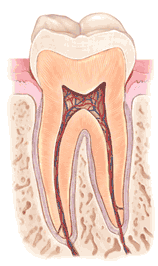
Nothing is as good as a natural tooth!
And sometimes your natural tooth may need
root canal (endodontic) treatment for it to
remain a healthy part of your mouth.
Most patients report that having root
canal (endodontic) treatment today is as
unremarkable as having a cavity filled.
If you've been told you need root canal
(endodontic) treatment, you can find the
answers to your questions below.
Who performs
endodontic treatment?
All dentists, including your general
dentist, receive basic training in
endodontic treatment in dental school.
General dentists often refer patients
needing endodontic treatment to
endodontists.
Who is an “endodontist”?
An endodontist
is a dentist with special training in
diagnosing and treating problems associated
with the inside of the tooth. They do only
endodontic procedures in their practices
because they are specialists. To become
specialists, they complete dental school and
an additional two or more years of advanced
training in endodontics, one of the nine
specialties recognized by the American
Dental Association. They perform routine as
well as difficult and very complex
endodontic procedures, including retreatment
of previous root canals that have not healed
completely, as well as endodontic surgery.
Endodontists are also experienced at finding
the cause of oral and facial pain that has
been difficult to diagnose.
Why would I need
an endodontic procedure?
Endodontic treatment is necessary when
the pulp, the soft tissue inside the root
canal, becomes inflamed or infected. The
inflammation or infection can have a variety
of causes: deep decay, repeated dental
procedures on the tooth, or a crack or chip
in the tooth. In addition, an injury to a
tooth may cause pulp damage even if the
tooth has no visible chips or cracks. If
pulp inflammation or infection is left
untreated, it can cause pain or lead to an
abscess.
What are the signs of
needing endodontic treatment?
Signs to look for include pain, prolonged
sensitivity to heat or cold, tenderness to
touch and chewing, discoloration of the
tooth, and swelling, drainage and tenderness
in the lymph nodes as well as nearby bone
and gingival tissues. Sometimes, however,
there are no symptoms.
How does endodontic
treatment save the tooth?
The endodontist removes the inflamed or
infected pulp, carefully cleans and shapes
the inside of the canal, a channel inside
the root, then fills and seals the space.
Afterwards, you will return to your dentist,
who will place a crown or other restoration
on the tooth to protect and restore it to
full function. After restoration, the tooth
continues to function like any other tooth.
Will I feel pain
during or after the procedure?
Many endodontic procedures are performed
to relieve the pain of toothaches caused by
pulp inflammation or infection. With modern
techniques and anesthetics, most patients
report that they are comfortable during the
procedure.
For the first
few days after treatment, your tooth may
feel sensitive, especially if there was pain
or infection before the procedure. This
discomfort can be relieved with
over-the-counter or prescription
medications. Follow your endodontist’s
instructions carefully.
Your tooth may continue to feel slightly
different from your other teeth for some
time after your endodontic treatment is
completed. However, if you have severe pain
or pressure or pain that lasts more than a
few days, call your endodontist.
How much will the
procedure cost?
The cost varies depending on how complex
the problem is and which tooth is affected.
Molars are more difficult to treat, the fee
is usually more. Most dental insurance
policies provide some coverage for
endodontic treatment.
Generally, endodontic treatment and
restoration of the natural tooth are less
expensive than the alternative of having the
tooth extracted. An extracted tooth must be
replaced with a bridge or implant to restore
chewing function and prevent adjacent teeth
from shifting. These procedures tend to cost
more than endodontic treatment and
appropriate restoration. With root canal
treatment you save your natural teeth and
money.
Will the tooth
need any special care or additional
treatment after endodontic treatment?
You should not chew or bite on the
treated tooth until you have had it restored
by your dentist. The unrestored tooth is
susceptible to fracture, so you should see
your dentist for a full restoration as soon
as possible. Otherwise, you need only
practice good oral hygiene, including
brushing, flossing, and regular checkups and
cleanings.
Most endodontically treated teeth last as
long as other natural teeth. In a few cases,
a tooth that has undergone endodontic
treatment does not heal or the pain
continues. Occasionally, the tooth may
become painful or diseased months or even
years after successful treatment. Often when
this occurs, redoing the endodontic
procedure can save the tooth.
What causes an
endodontically treated tooth to need
additional treatment?
New trauma, deep decay, or a loose,
cracked or broken filling can cause new
infection in your tooth. In some cases, the
endodontist may discover additional very
narrow or curved canals that could not be
treated during the initial procedure.
Can all teeth be
treated endodontically?
Most teeth can be treated. Occasionally,
a tooth can’t be saved because the root
canals are not accessible, the root is
severely fractured, the tooth doesn’t have
adequate bone support, or the tooth cannot
be restored. However, advances in
endodontics are making it possible to save
teeth that even a few years ago would have
been lost. When endodontic treatment is not
effective, endodontic surgery may be able to
save the tooth.



